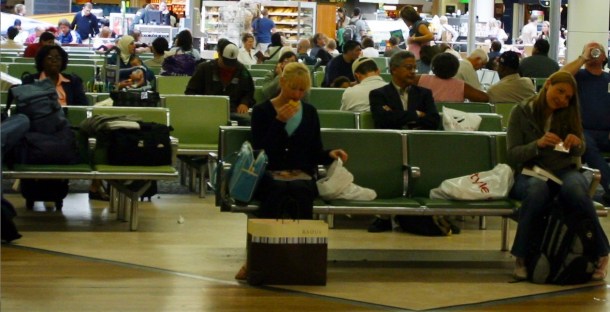
Some light Sunday reading for those who wonder about the wisdom of Australian governments selling natural monopolies like airports to private shareholders is to be found in the UK media over a crackdown on some London airport charges.
As stories like this suggest, the issue has put the public and the airlines on the same side of the ‘barricades’ in this long running British brawl. Finance sector media, like Bloomberg, deal more fully with the in-your-face threat of a capital strike by the owners of London Heathrow and London Gatwick.
And it is an issue that may flare up again in Sydney for example, where the Abbott Government is due to ‘soon’ announce a decision on a go ahead with an in-principle approval of the private development of a second airport at the Badgerys Creek site.
Any controversy over the building of Sydney West is likely to be less divisive than it was in the past, and in all probability, largely welcomed. It is a concept whose time has well and truly come.
The difficult issue will be dealing with the consequences of an airport privatisation policy that finished with the sale of Sydney’s Kingsford Smith in 2002 in which price ($5.6 billion) was the big plus, and the granting to the winning consortium the right to screw the public and the city forever with anti-competitive pricing becoming the big, yet seldom highlighted, minus.
The Howard Government allowed for ‘light handed regulation.’ Light, as in allowing Sydney Airport to tell its customers to ‘stick them up’. Subsequent Labor governments were totally useless in trying to remedy the situation as in continuing a policy of allowing the ACCC to monitor how bad things were without it being empowered to do anything about it.
The question of privatising state monopolies in other essential services is a vexed one, on the one hand removing the responsibility of government to fund various things from the public purse, but creating monopolistic pricing regimes with perpetual negative inputs for national economic productivity.
The British airport example is not exactly nor strictly relevant to Australian airports in history or methodology. But it is relevant in terms of UK efforts to prevent air travellers and airlines, and for that matter, airport retailers as well, being exploited by airport owners in situations where the critical mass of market share, and localised domination, worked against good competitive and economic outcomes even though London has multiple, but mostly well spaced airports.
One of the potentially disastrous things the Howard Government did in relation to the sale of Sydney Airport was granting whomever won the bidding the first right of refusal over the ownership of a second jet airport in the Sydney basin. This means that despite all the derision Sydney Airport heaps on the notion of a Sydney West airport, it can elect to go ahead and own one on the designated site to preserve its monopoly pricing power over airport services in the entire Sydney basin and save itself from the competitive pressure that might be applied if the new airport had different owners.
The only way Government can readily deal with this is not to try and change the relevant legislation covering the purchase of Sydney Airport (and any second airport) but to be very, very serious about imposing a strict public interest regulatory environment with effective sanctions over the pricing power of the new airport’s owner should that turn out to be the existing Sydney Airport, or related to it.
The new airport competition laws would also need to envisage the possibility (however unlikely today) that a Sydney West airport of considerable size by 2040 might acquire the much older original Sydney Airport. In the Asian century, and with predictions of a rapid doubling in greater Sydney’s population, such developments are more than possible.








Crikey is committed to hosting lively discussions. Help us keep the conversation useful, interesting and welcoming. We aim to publish comments quickly in the interest of promoting robust conversation, but we’re a small team and we deploy filters to protect against legal risk. Occasionally your comment may be held up while we review, but we’re working as fast as we can to keep the conversation rolling.
The Crikey comment section is members-only content. Please subscribe to leave a comment.
The Crikey comment section is members-only content. Please login to leave a comment.